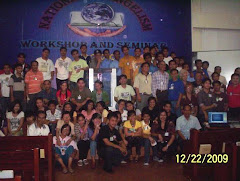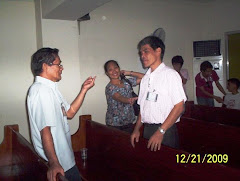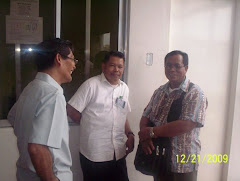
The church in Cabangan is the only church of Christ in the Philippines whose membership wholly consists of Aetas, or Negritoes (Spanish for “little black men”). At the time we met them (November 1989), they were led by a matriarchal figure named Rosita. I say “led” because I noticed that all the men listened to her, like her word was law. She was the wife of the most mature man among the group and exercised great influence among them. It was she who scheduled the classes for us.
These Aetas came down from Mount Pinatubo because food was scarce in the mountains. And so in the low lands they made do with what they could gather and hunt— wild animals like lizards and snakes and bananas and wild fruits from the riverside near the settlements of the Ilocanos. They helped in the harvesting of palay, and got paid either with money or with palay.
This was in the last days of 1989. I volunteered to do much of the teaching, in Tagalog, which they also understood. My brother-in-law Tom would read the passages I cited in class in the Zambal dialect (the dialect of the Negritoes) using the Zambal translation of the Bible. That was how they came to know of the grace of Jesus and of their great need for a Savior. We spent a whole month teaching them. When they were ready, Tom baptized them in a river nearby.
We in a manner of speaking converted a whole village of them in San Juan, Cabangan, Zambales, consisting of 25 men and women not including children. After they became a church, we conducted worship services in the afternoons of Sunday. Tom and his family and I were then based in San Narciso. I was helping him grow the church there too.
I left Zambales for Butuan City in February 1990. Tom went on and taught some more Negritoes in the area. His big break came when he baptized Ilocano families who owned farms in Cabangan. It signaled the beginning when the brown brethren (the Ilocanos) were gradually assimilated with the black brethren (the Negritoes) in the spirit of oneness with the God who saved both of them.
In the middle of 1990′s the late brother Lee Smeltzer donated some money to acquire the 1.5 hectare property above the Negrito settlement, now located in the village of Dolores, Cabangan. A year or so later, a chapel was built for this church with the funds donated by other US brethren.
There were fifty or more Negrito brethren in attendance when I preached there last Sunday, November 7, not including children. Tom told me that this Negrito church consists of 300 or more members. Many did not come; one reason was that the majority had moved to other places in Zambales, to Manila, and to Mindanao in search of jobs and opportunities to make a living.
Last Sunday I spoke on the subject so dear to my heart, using Hebrews 12:1-3 as text. I think I spoke for an hour, but nobody even noticed it! The Aeta brethren were reacting to my sermon, smiling as I spoke, making some favorable comments on my illustrations, nodding their heads in agreement!
That Sunday morning they had a meeting, and made a decision to support the coming Lectureship event this November 20. Each family will contribute a hundred pesos for the food. They already had collected over a thousand pesos for this purpose. Marcial the preacher says he will donate a sack of rice. They expect an attendance of over a hundred on that day. Five speakers, including Tomas Lizardo and me and others from Kalaklan church will be speaking on this lectureship.
There is a plan to establish here a Bible school that will serve the Negrito and Ilocano brethren in the area. Two teachers have volunteered to teach. You will hear more about this work in the days ahead.








.jpg)






































